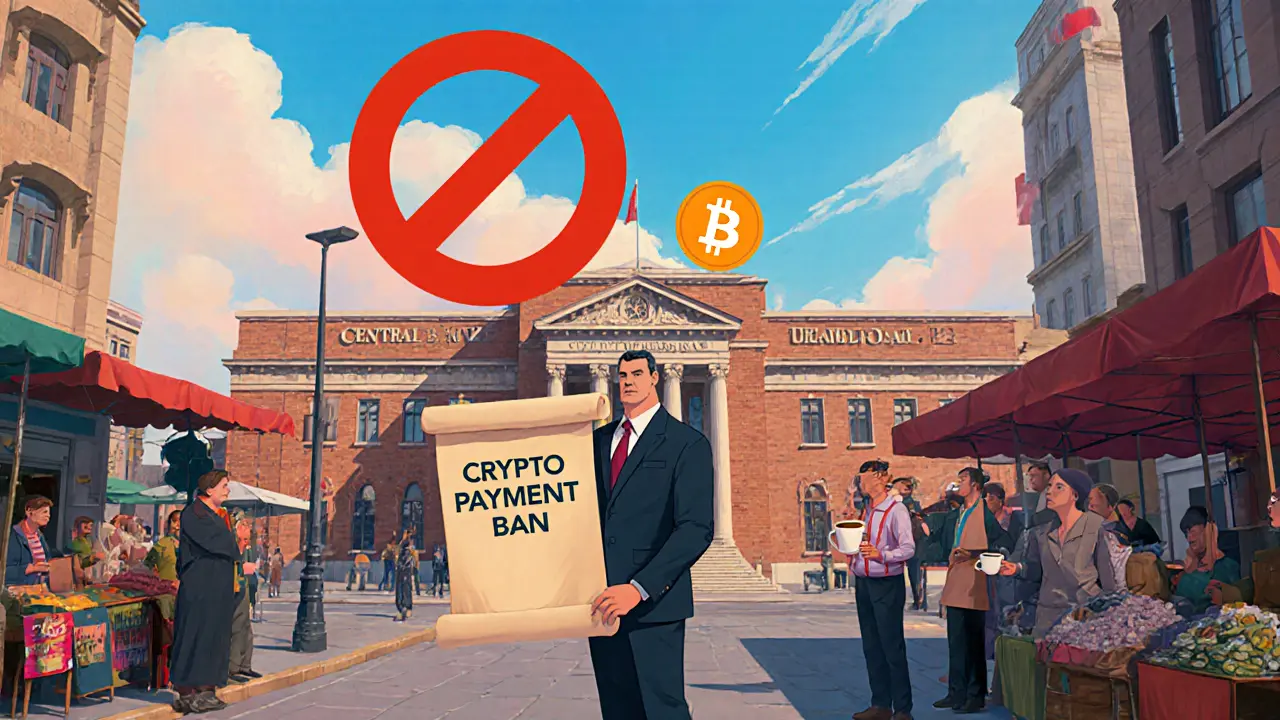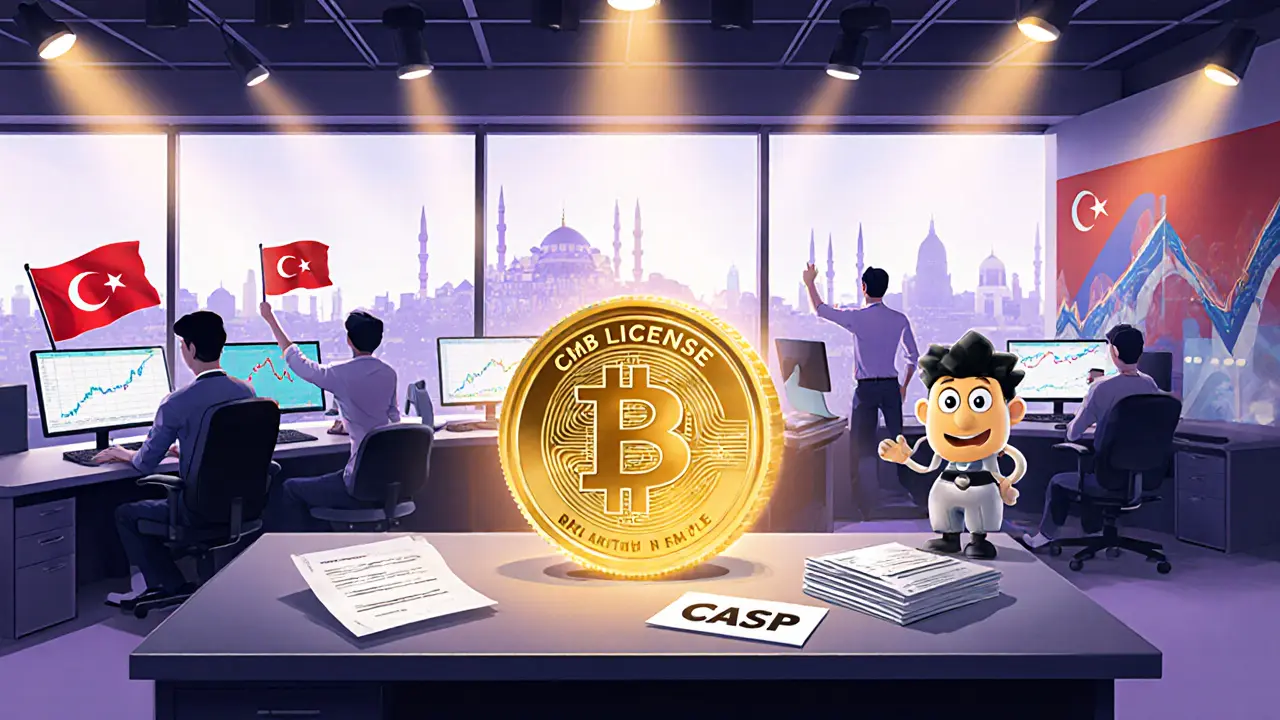 May, 20 2025
May, 20 2025
Turkey Crypto Compliance Calculator
Check Your Compliance with Turkey's Crypto Regulations
This tool helps you verify if your business meets Turkey's current regulatory requirements for crypto operations.
Please complete the form to see your compliance status.
When the Turkey crypto payment ban was announced in April 2021, it sent a clear signal that digital currencies could be traded but not used for everyday purchases. The Central Bank of the Republic of Turkey (CBRT) issued the regulation on April 16, 2021 and it became effective on April 30, 2021. Since then the rule set has been tweaked, new licensing requirements have been added, and a handful of legal challenges are now shaping the next chapter.
What the 2021 Ban Actually Prohibits
The CBRT wording is blunt: “cryptoassets will not be used for payments, directly or indirectly.” In practice this means:
- Merchants cannot accept Bitcoin, USDT or any other digital token as payment for goods or services.
- Payment institutions and electronic‑money issuers are forbidden from processing crypto‑related transactions.
- Wallet‑to‑wallet transfers that are intended to settle a purchase are considered a violation.
What the law does NOT ban is the ability to buy, sell, transfer or hold crypto on licensed platforms. Trading remains legal, and crypto is not classified as a prohibited good.
Why the Ban Was Introduced - The Five Risks Cited by CBRT
The CBRT highlighted five specific concerns that still drive policy today:
- Lack of supervision - cryptoassets operate without a central regulator.
- Volatility - prices swing wildly, creating systemic risk.
- Anonymous structure - makes money‑laundering and illicit financing easier.
- Wallet theft - stolen keys give attackers unrestricted access.
- Irreversibility - once a crypto payment is sent, it cannot be undone.
These points are repeated in legal analyses from BakerMcKenzie (April2021) and NortonRoseFulbright (May2022), reinforcing the CBRT’s risk‑based approach.
Trading Is Still Allowed - How the Market Adapted
Because the ban only targets payments, exchanges rushed to obtain the necessary licences from the Capital Markets Board (CMB). By the end of 2022 most major platforms - Binance Turkey, Paribu, BtcTurk - were operating under a “crypto asset service provider” (CASP) framework that permits:
- Buying and selling crypto for Turkish lira.
- Transferring assets between users on the same platform.
- Custody services for private keys, as long as the provider holds a CMB licence.
The market exploded. A 2023 survey showed 19.3% of the Turkish population actively using cryptocurrencies, up from just 1.7% in 2020. The sector was valued at roughly $170billion by the end of 2024 (Finance Magnates).
Licensing Evolution - The 2024‑2025 CMB Amendments
In July2024 the Turkish parliament passed the “Law on Amendments to the Capital Markets Law.” The key change: every CASP must now hold an operating licence from the CMB. The capital thresholds are steep:
- Exchanges need TRY150million (≈$4.1million) in paid‑up capital.
- Custodians require TRY500million (≈$13.7million).
These numbers are meant to weed out low‑cap players and ensure that only well‑funded entities can manage Turkish users’ funds. The Financial Crimes Investigation Board (MASAK) now oversees AML compliance, while the Scientific and Technological Research Council of Türkiye (TÜBİTAK) checks that technical standards for wallets and smart‑contract audits are met.

AML Thresholds and Transaction Rules - What Changed in 2024‑2025
December2024 saw the publication of new AML rules in the Official Gazette (No.31456). The highlights:
- Any transaction above TRY15,000 (≈$425) must be linked to verified identity documents.
- Transfers to unregistered wallet addresses trigger a “risky” flag and may be suspended until the sender provides additional information.
- All CASPs must retain complete transaction logs, including failed or cancelled attempts, for at least five years.
The rules took effect on February252025. Deloitte’s January2025 industry report noted a 30‑40% jump in compliance staffing at major exchanges to meet the new obligations.
Impact on Users and Businesses
For everyday users the biggest pain point remains the inability to pay for coffee, rent or public transport with crypto. Reddit’s r/CryptoTurkey community frequently posts screenshots of “I can trade Binance but can’t use my USDT for dinner.” The sentiment is summed up by a user named AnkaraTrader88 (January152025): “I can trade freely but can’t use my USDT to pay for dinner-that’s the Turkish crypto paradox.”
Businesses face a compliance maze. A merchant that wishes to accept crypto must first become a licensed payment institution, and then prove that every payment is settled in Turkish lira before the transaction is recorded. Most small‑to‑medium enterprises avoid the hassle; a 2024 TÜİK survey reported only 2% of Turkish businesses accept crypto, compared with 14% in neighboring Georgia.
Exchanges, however, have seen a boom. Binance Turkey’s Trustpilot rating sits at 3.8/5 from over 1,200 reviews (February2025), with many praising the trading experience but lamenting the payment ban.
Current Legal Challenge and Future Outlook
On May282025 a landmark case will be heard in Ankara’s court. SimaBaktaş, founding partner of GlobalB, argues that the payment ban stifles innovation and that lifting it would “make payments more effective and increase Turkey’s attractiveness for blockchain businesses.” The lawsuit references rapid user growth - an 11‑fold increase in 2021 - and cites potential economic benefits of a more open payments landscape.
Two forces are at play:
- The CMB’s recent crackdown - blocking 46 DeFi platforms in March2025 - signals a tightening regulatory stance.
- International pressure and the desire to keep the $170billion market alive push policymakers toward a more nuanced approach.
If the court sides with GlobalB, we could see a revision of the payment clause, new licensing categories for “crypto‑payment processors,” and a shift in how Turkish banks interact with digital assets. Until then, the safest bet for anyone operating in Turkey is to treat the ban as a hard rule and focus on compliant trading activities.

Regulatory Timeline at a Glance
| Date | Event | Key Impact |
|---|---|---|
| 16Apr2021 | CBRT issues crypto payment ban | Payments prohibited; trading allowed |
| 30Apr2021 | Ban becomes effective | Merchants must stop accepting crypto |
| July2024 | CMB licensing amendment | CASPs need TRY150‑500m capital licences |
| 25Dec2024 | New AML rules published | 15k TRY threshold for KYC |
| 25Feb2025 | AML rules take effect | Identity verification mandatory for large transfers |
| Mar2025 | CMB blocks 46 DeFi platforms | Stricter oversight on DeFi activity |
| 28May2025 | GlobalB lawsuit begins | Potential challenge to payment ban |
Quick Checklist for Crypto Businesses in Turkey
- Do not process any crypto‑to‑fiat payment for goods or services.
- Obtain a CMB licence if you act as an exchange, custodian or wallet provider.
- Implement KYC/AML systems that flag transfers above TRY15,000.
- Maintain full audit trails for every transaction, successful or not.
- Stay updated on court rulings and CMB bulletins - the regulatory landscape can shift overnight.
Frequently Asked Questions
Can I use Bitcoin to pay for groceries in Turkey?
No. The CBRT’s 2021 regulation explicitly forbids any crypto‑based payment for goods or services, including groceries.
Is trading crypto on local exchanges still legal?
Yes. As long as the exchange holds a CMB licence, buying, selling and transferring crypto between accounts is permitted.
What is the AML threshold for crypto transactions?
Transactions over TRY15,000 must be linked to verified identity documents. The rule started on 25February2025.
Do the new CMB capital requirements affect existing exchanges?
All exchanges operating in Turkey had to demonstrate that they meet the TRY150million (or TRY500million for custodians) capital threshold by the end of 2024. Those that couldn’t comply were ordered to cease operations.
Could the payment ban be lifted in the future?
The May2025 lawsuit filed by GlobalB may force a revision, but the CMB’s recent enforcement actions suggest the regulators prefer a cautious approach. Keep an eye on court outcomes and any official statements from the CBRT.
Shikhar Shukla
May 20, 2025 AT 00:10The current licensing thresholds represent an uncanny departure from proportional oversight, demanding capital far beyond the realistic capacity of most domestic operators. Such a steep requirement effectively thwarts competition and consolidates market power among a handful of well‑funded entities. Moreover, the insistence on a TRY150 million minimum for exchanges disregards the nascent state of crypto adoption among everyday Turkish consumers. In sum, the regulatory posture appears more punitive than protective.
Deepak Kumar
May 20, 2025 AT 02:57Hey folks, let’s keep the momentum going! The fact that trading remains legal shows the CBRT isn’t trying to kill the ecosystem, just steer it toward responsible growth. If you’re a small‑scale trader, focus on platforms that already hold the CMB licence – they’ve built the compliance infrastructure you’ll need. And don’t forget to stay on top of KYC updates; a proactive approach will save you headaches down the line. Keep pushing, the market’s still ripe with opportunity!
Matthew Theuma
May 20, 2025 AT 05:43🤔 It’s fascinating how the ban isolates payments but leaves the speculative side untouched – kind of like allowing people to watch a concert without letting them buy tickets. The philosophical angle is that money, at its core, is a social contract, and the state is rewriting that contract for digital assets. Still, the enforcement seems uneven, and that creates a gray area where users might feel defiantly empowered. Anyway, just a thought, nothing more. 😅
Carolyn Pritchett
May 20, 2025 AT 08:30Honestly, the whole AML threshold is a slap in the face for anyone trying to use crypto for legitimate everyday needs. By forcing identity checks on transfers over a modest TRY15 k, the regulators are basically saying ‘We don’t trust you until you prove you’re not a criminal.’ It’s a classic case of over‑regulation that will only drive users toward black‑market solutions.
Jason Zila
May 20, 2025 AT 11:17The legal challenge slated for May 2025 could be a watershed moment for Turkey’s digital economy. If the court sides with GlobalB, we may witness a paradigm shift that redefines how crypto payments are perceived under Turkish law. Such a decision would likely force the CBRT to amend the payment clause, opening the door for licensed crypto‑payment processors. Until that verdict, the safest strategy remains strict adherence to the current ban while leveraging the thriving trading ecosystem.
Pierce O'Donnell
May 20, 2025 AT 14:03Regulation looks like a bureaucratic nightmare.
Cecilia Cecilia
May 20, 2025 AT 16:50I feel you – the paperwork feels endless and the capital demands are overwhelming
Kaitlyn Zimmerman
May 20, 2025 AT 19:37From a cultural perspective, it’s interesting to see how Turkish users have adapted, forming vibrant online communities despite the payment restrictions. Platforms like r/CryptoTurkey provide a space for sharing tips on compliant trading, and the collective knowledge has grown tremendously. This grassroots resilience underscores the fact that regulation alone cannot quash innovation.
Jessica Cadis
May 20, 2025 AT 22:23While the community spirit is commendable, the aggressive crackdown on DeFi platforms in March 2025 sends a clear message that the authorities will not tolerate any perceived loopholes. The distinction between a ‘payment’ and a ‘transfer’ is being stretched to its limits, and that ambiguity hurts both users and developers.
Katharine Sipio
May 21, 2025 AT 01:10Stay positive, everyone! The market’s still expanding, and with proper compliance you can continue to trade safely. Simple steps like keeping your KYC documents up to date will go a long way.
Shivani Chauhan
May 21, 2025 AT 03:57In accordance with the recent CMB amendments, it is advisable for entities to audit their capital reserves quarterly to ensure ongoing compliance. Precise documentation of all crypto transactions will also facilitate smoother regulatory reviews.
Sara Stewart
May 21, 2025 AT 06:43Exactly, the AML thresholds now act as a de‑facto KYC gatekeeper, and the custodial firms must bolster their audit trails to meet the five‑year retention mandate. This heightened scrutiny, though onerous, aligns with international best practices and could enhance market legitimacy.
Laura Hoch
May 21, 2025 AT 09:30The Turkish crypto landscape presents a paradox that is both intellectually stimulating and practically frustrating.
On one hand, the CBRT draws a firm line against using digital assets for everyday payments, citing legitimate concerns about volatility and money‑laundering.
On the other hand, it simultaneously encourages a thriving trading sector by granting licences to exchanges that meet stringent capital requirements.
This duality forces market participants to constantly navigate a shifting regulatory minefield, adjusting their business models to remain compliant.
From a philosophical standpoint, the ban underscores a deeper tension between state control and individual financial sovereignty.
When the state insists that money must be traceable and reversible, it implicitly questions the very nature of trust that underpins cryptocurrency.
Yet, the continued growth of user adoption-nearly one in five Turks now actively engages with crypto-suggests that the demand for decentralized finance cannot be easily suppressed.
The recent AML thresholds, mandating identity verification for transfers above TRY15 k, further blur the line between legitimate commerce and illicit activity.
Critics argue that such measures impose an unnecessary burden on ordinary users while targeting sophisticated actors with the same blunt instrument.
Proponents, however, contend that these safeguards are essential to align Turkey with global financial standards and to prevent systemic risk.
The upcoming lawsuit by GlobalB could become a litmus test for how flexible the regulatory framework can become without abandoning its core principles.
If the courts endorse the challenge, we might see the emergence of a new category of licensed crypto‑payment processors, effectively rewriting the payment clause.
Conversely, a ruling in favor of the CBRT would likely cement the current restrictive regime and possibly deter future innovation.
Investors and entrepreneurs should therefore monitor both legislative updates and judicial outcomes with equal vigilance.
In practical terms, maintaining rigorous KYC procedures, robust custodial security, and transparent audit logs will position firms favorably regardless of the eventual legal outcome.
Ultimately, the Turkish experiment reflects a broader global debate on how to balance financial innovation with consumer protection, a conversation that will undoubtedly evolve in the years to come.
Devi Jaga
May 21, 2025 AT 12:17Oh, great – another “innovative” regulatory tweak that pretends to protect us while starving the ecosystem. The jargon‑laden directives sound impressive on paper, yet in reality they just add layers of bureaucracy for the sake of appearing tough on crypto. If the authorities think a passive‑aggressive legalese will solve the underlying issues, they are sadly mistaken.
Hailey M.
May 21, 2025 AT 15:03Wow, what a rollercoaster! 🎢